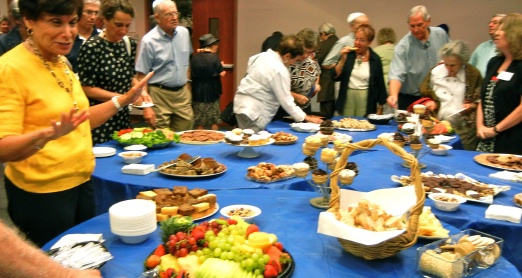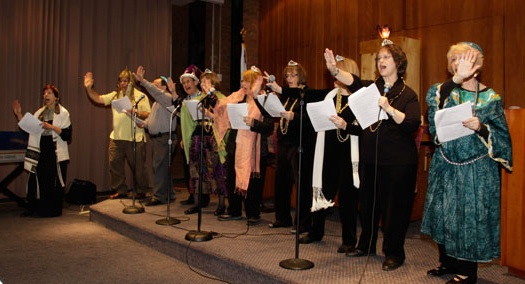 The Holidays page provides you with a portal to information about the major Jewish holidays and how we celebrate them at Bet Aviv. Under this heading you will find information about the following Jewish holidays:
The Holidays page provides you with a portal to information about the major Jewish holidays and how we celebrate them at Bet Aviv. Under this heading you will find information about the following Jewish holidays:
Posts by :
Synagogue Administrator
Lin Mascia is our synagogue administrator. Lin answers our phone, takes care of the mail, manages our membership database, keeps track of your payments, writes checks for our expenses and more! She is responsible for creating the program booklets for each worship service and sends reminders about upcoming yahrzeits. At the beginning of each calendar year, Lin sends each member an invoice for dues for the coming year and includes a list of donations and payments you made that you can use for tax purposes.
Please contact Lin if you have any changes to your membership information such as new address, phone number of e-mail address. She can tell you if a payment you made has been received and answer general questions you have about Bet Aviv or direct you to someone else. Lin also sends a new member packet to prospective members.
Office Hours: Lin is generally in the office on Tuesday, Wednesday and Thursday of each week between the hours of 9:00 AM and 2:00 PM. Please call ahead before stopping by to ensure she will be there when you want to come.
Telephone: You can reach Lin on our office phone at 410-992-9994.
E-Mail: You can contact Lin via e-mail at: admin@betaviv.org.
Forms
This page contains administrative forms that you might find useful. Most of these forms appear in two formats since they require your input. If you have Microsoft Word on your computer, you may download the Word format, and fill it out online. If a payment is to be included, then you would print the form and send it along with your check to the Bet Aviv office. Instructions for filling out the form are included on the from. If you don’t have Microsoft Word on your computer, you may print out the pdf version of the form and then fill in the blanks by hand.
- Donation Form (pdf)
- Donation Form (Word)
- Expense Reimbursement Form (pdf)
- Expense Reimbursement Form (Word)
- Membership Application (pdf)
- Membership Application (Word)
- Memorial Plaque Order Form (pdf)
- Memorial Plaque Order Form (Word)
- Observer Ad Order Form (pdf)
- Observer Ad Order Form (Word)
- Oneg Sponsorship Form (pdf)
- Oneg Sponsorship Form (Word)
- Prayer Book Order Form (pdf)
- Prayer Book Order Form (Word)
- Stationery Template
Procedures
This page consists of a list of procedures that are related to the role of Shabbat Hosts and those who are bestowed honors during a Shabbat service. It also contains the procedures associated with returning to worship at The Meeting House following the corona virus pandemic.
- In-Person Worship Procedures
- Shabbat Service Honors Instructions
- Event Checklist (Word)
- Event Checklist (pdf)
It also contains a link to the Bet Aviv Handbook that answers many of your questions about Bet Aviv.
Click here for the link to the Bet Aviv Archives Quick Start Guide.
Responsibilities
This page contains the responsibilities for chairs of Board and Non-Board Committees, as well as some High Holiday volunteers.
Board Committee Chair Responsibilities
- Adult Education
- Faciltiies
- Federation Representative
- Membership
- Ritual/Worship
- Secretary
- Social Action
- Special Events
- Treasurer
Non-Board Committee Chair Responsibilities
- Newsletter Editor
- Passover Seder Coodinator
- Scholar in Residence Coordinator
- Shabbat Host Coordinators
- Webmaster
- Yom Hashoah Representative
High Holiday Volunteers
Policies
This page contains a list of Bet Aviv’s official policies that have been approved by the Board.
- Associate Membership Policy
- Bet Aviv Archives
- Bet Aviv Bylaws
- Bet Aviv Funds Policy
- Bet Aviv Privacy Policy
- Bnai Mitzvah Policy
- Cantor’s Discretionary Fund Policy
- Committee and Chairperson Policy
- Dues Policy for New Members
- Election of Co-Presidents Policy
- Food Policy
- Funeral Policy
- HIAS Refugee Statement
- High Holiday Ticket Policy
- Inclement Weather Policy
- Policy on Committees and Chairs
- Policy on Issue Postions
- Policy on Payment of Dues
- Rabbi’s Discretionary Fund
- Return to OMI Worship Policy
- Special Event Break-Even Policy
Oneg Shabbat

An Oneg Shabbat is a wonderful way to catch up with old friends and make new ones.
Bet Aviv welcomes its congegants to usher in Shabbat at our Oneg following the Shabbat service. As we move into our Oneg room, our Shabbat Hosts distribute wine to our congregants. We recite the kiddush (blessing for the wine) and motzi (blessing for the bread) as we form a circle around the Oneg table. We pass around the challah after the motzi. Then we get a chance to welcome guests who have come to visit, greet long-time friends and say hello to members we would like to get to know better. Bet Aviv has hired a person with food management experience to purchase the food for our Onegs, plate and display the array, replenish food and drink as required during the Oneg, and to clean up afterwards. As part of bringing tikun olam to Shabbat, we package up leftover food and bring it to Grassroots, a local shelter that feeds the hungry.
We encourage members to celebrate their mitzvahs with the congregation. If you have a special birthday, anniversary, or event (e.g., baby naming, retirement) in your life and would like to sponsor an Oneg, please contact our office. Click here to download the Oneg Sponsorship form.
Click here for the blessing over the wine (Borei p’ri hagafen).
Click here for the blessing over the bread (HaMotzi).
Purim
Purim is celebrated with a public reading—usually in the synagogue—of the Scroll of Esther (M’gillat Esther), which tells the story of the holiday. Under the rule of King Ahashverosh, Haman, the king’s prime minister, plots to exterminate all of the Jews of Persia. His plan is foiled by Queen Esther and her cousin Mordechai, who ultimately save the Jews of Persia from destruction. The reading of them’gillah typically is a rowdy affair, punctuated by booing and noise-making when Haman’s name is read aloud.
Purim is an unusual holiday in many respects. First, Esther is the only biblical book in which God is not mentioned. Second, Purim, like Hanukkah, traditionally is viewed as a minor festival, but elevated to a major holiday as a result of the Jewish historical experience. Over the centuries, Haman became the embodiment of every anti-Semite in every land where Jews were oppressed. The significance of Purim lies not so much in how it began, but in what it has become: a thankful and joyous affirmation of Jewish survival against all odds.
Read more about the history and customs of Purim.

Simchat Torah
Simchat Torah (Rejoicing in the Law) celebrates the completion of the annual reading of the Torah. This joyous festival provides opportunities for Jews to affirm the centrality of Torah in their lives, as well as to demonstrate their commitment to lifelong study. As part of the celebration, the Torah scrolls are taken from the ark and carried or danced around the synagogue seven times. During the Torah service, the concluding section of the fifth book of the Torah, D’varim (Deuteronomy), is read, and immediately following, the opening section of Genesis, or B’reishit as it is called in Hebrew, is read. This practice represents the cyclical nature of the relationship between the Jewish people and the reading of the Torah.
Read more about the history and customs of Simchat Torah.
Sukkot
 Sukkot, a Hebrew word meaning “booths” or “huts,” refers to the Jewish festival of giving thanks for the fall harvest, as well as the commemoration of the forty years of Jewish wandering in the desert after Sinai. Sukkot is celebrated five days after Yom Kippur on the 15th of Tishrei and is marked by several distinct traditions. One tradition, which takes the commandment to “dwell in booths” literally, is to build a sukkah, a booth or hut. A sukkah is often erected by Jews during this festival, and it is common practice for some to eat and even live in these temporary dwellings during Sukkot.
Sukkot, a Hebrew word meaning “booths” or “huts,” refers to the Jewish festival of giving thanks for the fall harvest, as well as the commemoration of the forty years of Jewish wandering in the desert after Sinai. Sukkot is celebrated five days after Yom Kippur on the 15th of Tishrei and is marked by several distinct traditions. One tradition, which takes the commandment to “dwell in booths” literally, is to build a sukkah, a booth or hut. A sukkah is often erected by Jews during this festival, and it is common practice for some to eat and even live in these temporary dwellings during Sukkot.
Read more about the history and customs of Sukkot.
